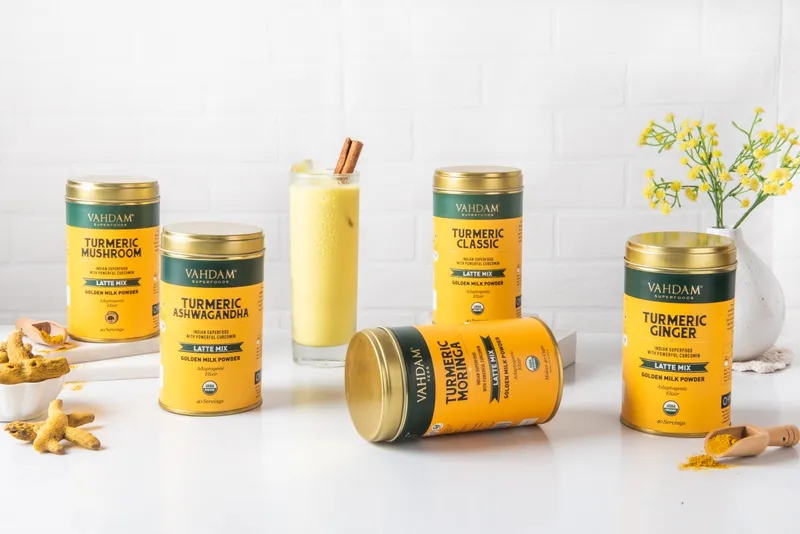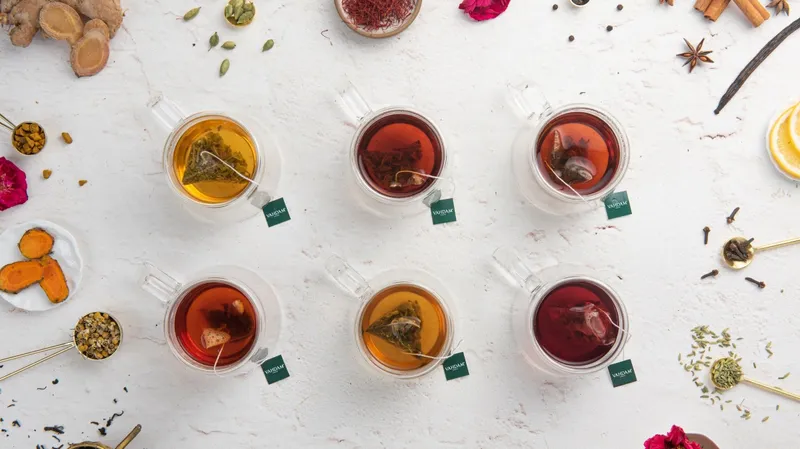Wellness and education form the core of VAHDAM India’s new tea room in Delhi
The VAHDAM India Tea Room offers a sensorial experience to tea enthusiasts, incorporating both wellness and education in equal measure.
India’s love affair with chai is no secret. Many of us don’t wake up and smell the coffee (pun intended) but get our caffeine kick from the quintessential tea laden with milk and sugar. If one kick wasn’t enough, we manage to find plenty of reasons to squeeze in more cups of tea during the day.
While traditional doodh wali chai has always been a staple in many households, there is now a growing interest in wellness teas infused with indigenous spices, particularly among the millennials and GenZ who are more conscious about their health and well-being. This is where VAHDAM India has carved a niche for itself, ever since it came into existence in 2015.
Founded by fourth-generation entrepreneur Bala Sarda, who has a strong lineage in tea, VAHDAM India prides itself on being a homegrown Indian brand for the world.
VAHDAM India’s popularity in key markets such as the United States, Canada and Europe, alongside organic endorsements by global celebrities like Oprah Winfrey, Mariah Carey, and Martha Stewart, has reinforced its reputation as a strong international player.
While the digitally-native brand offers a large selection of wellness teas through multiple online channels, there was a missing link–the need for a sensorial experience that could educate and elevate the tea buying experience for consumers.
This gap led to the idea of an ‘experience store’, with India recently opening its first tea room in Delhi’s iconic Khan Market.

Inside the VAHDAM Tea Room in Delhi's upscale Khan Market
“The tea room is a representation of everything we do at VAHDAM. It is a space where consumers can visually and sensorially experience everything we have to offer. There are a lot of limited edition products–for instance, our Rose Vanilla Chai that we only do at the store,” Sarda tells YS Life.
“It’s not a cafe,” he reiterates.
An immersive tea experience
As you enter the 500-square feet store, be prepared to be serenaded by the heavenly aroma of multiple tea blends. This is only the beginning of what promises to be an exciting walkthrough of the tea room.
After all, one is in the midst of over 100-plus tea blends that reflect the varied cultural heritage of India. They find a pride of place in neat shelves and are available in both tea bags and loose leaf tea formats.

Bala Sarda, Founder of VAHDAM India
While the VAHDAM India Tea Room does not sell teas by the menu, visitors can sample as many teas as they wish to. Interestingly, there is a rotating menu offering a curated selection of four teas of the day–a combination of blends, green teas, herbal teas, or black teas in iced and hot formats.
Tea enthusiasts can sit back in a quiet corner in a dedicated seating space and sample their chosen brew before making a purchase. It’s most likely that one’s eyes will notice a wall here, depicting the illustrious legacy of VAHDAM India through a timeline.
The tea room also showcases the brand’s diverse range of drinkware, accessories, and gift assortments, priced between Rs 399 and Rs 2,500. Visitors can also shop for store-exclusive teaware made from high-quality cast iron.
“We also encourage our customers to smell the tea leaves. Our tea sommeliers inside the store will tell visitors about the story of the tea and where it is sourced from. They can take a look at the packaging and understand how to make the tea,” Sarda remarks.
VAHDAM India’s unique offerings include single-estate first flush and second flush teas, apart from innovative blends such as Berry Cinammon Herbal Tea, Hibiscus Rose Herbal Tea, Chamomile Lavender-Green Tea and Vanilla Matcha.
The brand’s recently launched range of instant premix iced teas are subtle in sweetness and said to be low in calories (each serving has less than 10 calories, says the company). The popular options in this category include Hibiscus Apple and Peach Ginger.
Wellness first
For the longest time, coffee has been a drink of choice for the younger generation. While its popularity remains unaffected, there is a growing tribe of consumers who want to reduce their caffeine intake, as they view sleep as an important part of their lifestyle.
“A great replacement for coffee is wellness tea, and it will continue to grow over the next several decades,” says Sarda.

The VAHDAM India drinkware collection
While black tea continues to be the mainstay, premium wellness teas are also being embraced gradually in the country.
A media statement by a Tea Board official last year pegged the size of the flavoured tea market, in terms of volume, at 60 million kilograms. This category currently accounts for just 0.5% of the country’s domestic consumption, but it is estimated to grow at an annual rate of 40-45%.
The trend can be attributed to Indians having a higher disposable income and being well-travelled, with more exposure to global flavours and cultures. There is a greater demand among consumers for more immersive experiences back home, on the lines of Brooke Bond Taj Mahal Tea House in Mumbai and San-Cha Tea boutiques in Delhi and Gurugram.
In fact, with millennials choosing to lead healthier lives, there is a spurt in interest in Indian superfoods such as haldi (turmeric), ashwagandha, tulsi, moringa, and more, but in modern formats. Sarda believes brands must innovate to bring native wellness remedies to customers.

VAHDAM India's turmeric-infused wellness tea range
Before the pandemic, VAHDAM India had launched a range of turmeric-infused wellness teas, such as turmeric ginger tea, turmeric ashwagandha tea, and turmeric moringa tea.
“Millennials who could earlier only consume turmeric through curries can now have the superfood through a format like herbal tea from a brand they can connect with. This makes all the difference,” says Sarda.
Looking into the future
VAHDAM India has been making a lot of noise recently. First with the launch of 25 single-origin spices tailored for the US market, in collaboration with Chef Vikas Khanna, and now with its tea room in Delhi, which offers visitors a peek into the brand and its offerings.
Sarda also wants to incorporate an element of education in the tea room.

The VAHDAM tea room offers an exclusive opportunity to tea enthusiasts to sample more than 100 tea blends
India, which is the second-largest producer of tea in the world, is involved in black, white, yellow, green, oolong, and herbal teas. With increasing popularity and innovation around tea, VAHDAM India wants to create more awareness around the country’s wellness tea culture through a weekly tea education programme, slated to start in November.
“Our chief tea educator will spend half a day on weekends; any customer can sign up for this and be a part of the session,” Sarda informs.
At the moment, VAHDAM India is keen to build a playbook around its tea room business and make it a success, before looking at expansion.
“Currently, perfecting this concept is our priority in the next six to twelve months. Once we think we are ready, we will hopefully have more tea rooms in India and abroad as well,” signs off Sarda.
Edited by Swetha Kannan







